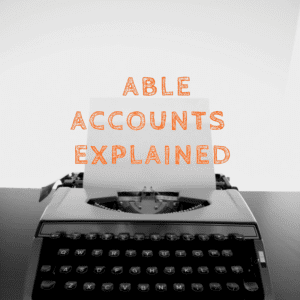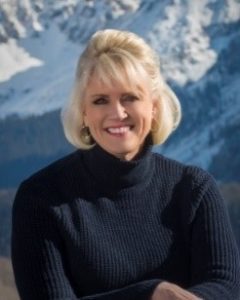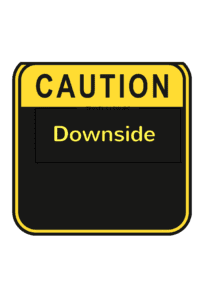
Like Medicaid programs, each state can roll out their version of an ABLE account, which I consider worth investiating and settingup much like a “launch fund” for your special needs student. I am financially awre, but not necessarily financially knowledgeable. That is why I contact Betty Lehman and Melissa Edelman from Centennial, Colorado. Both amazing women who demonstate great sensitivity and understanding of the special needs financial world.
ABLE Accounts: An Interview with Melissa Edelman, CLU, ChSNC
Melissa, what is a ChSNC?
A ChSNC is a Chartered Special Needs Consultant, a highly credentialed financial advisor, with specialized skills, to help parents and caregivers plan for the future with honesty, ethics, and compassion.
A ChSNC has the qualifications to navigate the unique considerations, tax deductions, healthcare issues, and Medicaid complexities, as well as the emotional aspects of addressing a quality future for a family member with special needs.
What is an ABLE Account?
ABLE provides a new opportunity for individuals with disabilities, to save funds to maintain their health, independence, and quality of life without jeopardizing financial eligibility to public benefits, such as Supplemental Security Income (SSI) and Medicaid.
An ABLE account is a financial product and, like many such products, can have varying costs and benefits.
When would I use an ABLE Account?
When a Beneficiary (the owner of the ABLE account) is working, ABLE:
- Provides an account to deposit excess earnings so he/she does not go above $2,000 asset limit
- Provides him/her autonomy over their money
- Has tax advantages
- Is easier than setting up a d.4.a. (first party) trust
- Provides more independence of access to funds than a pooled fund account
One “downside” is that if the Beneficiary passes away, the remaining funds must pay back Medicaid for services paid for since the inception of the ABLE account. This is also true of the remaining funds in a d.4.a. or first party Special Needs Trust.
A poor use of ABLE is to accumulate a significant amount of money from others, especially since a third party or Supplemental Needs trust is a better option for that purpose. If the beneficiary passes, the remaining funds in a Supplemental Needs trust can be distributed to family or charity, for example. An ABLE account is not a substitute for a trust.
There are limits on contributions. Currently, the annual contribution limit is $14,000 a year. A person can only have one ABLE account, so, the total contributions from all sources at this time can only be $14,000 annually.
There are distribution restrictions in an ABLE account, however, ABLE accounts can be used for quite a broad range of needs of the beneficiary.
What is the best use of ABLE?
A good use of an ABLE account is for the beneficiary’s excess earnings, especially since the beneficiary has control over expenditures as long as that use complies with the broad listed restrictions on expenditures.
A “qualified disability expense” is any expense for the beneficiary resulting from living with disabilities. These may include assistive technology, education, housing, transportation, employment training and support, personal support services, health care expenses, financial management and administrative services and other expenses which help improve health, independence, and quality of life.
Where can I obtain an ABLE account?
Currently, 4 states offer an ABLE product, however, only 3 states, Ohio, Tennessee and Nebraska allow those from out of state to set up an account. To compare the products, visit http:www.ablenrc.org/state_compare.
When will Colorado offer ABLE accounts?
Per the website, http:www.coloradoable.org, Colorado is anticipating a product launch in 2017.
Melissa, how do I know if an ABLE product is right for me?
You and your needs are unique. No two people enrolling in an ABLE account will have the same short and long term priorities for opening, saving in and managing an ABLE account. Talk with people you trust and with those who have documented experience with establishing strategies for managing resources for people with special needs and their families.

Melissa is a graduate of the California State University at Northridge with a Bachelor of Science Degree in Business-Finance. She holds FINRA licenses 7 (general securities), 24 (registered principal), 63 (blue sky), and 65 (registered investment advisor) and a Colorado Life and Health Insurance Producers License. She holds the Certified Long Term Care designation and has advanced her education of estate and financial planning for special needs families by earning the Chartered Special Needs Consultant (ChSNC) designation, granted by the American College in Bryn Mawr, PA. She is the first advisor to hold this designation in Colorado. Melissa is a member of NAIFA Denver (National Assoc. of Insurance and Financial Advisors) and served as its President from 2012-2013. She is a member of Denver Estate Planning Council and Society of Financial Services Professionals.
Melissa Edelman is a registered representative of and offers securities, investment advisory and financial planning services through MML Investors Services, LLC. member SIPC. 4600 S. Ulster St. Suite 1200, Denver, CO 80237. 303-300-4341. CRN201407-1620001

